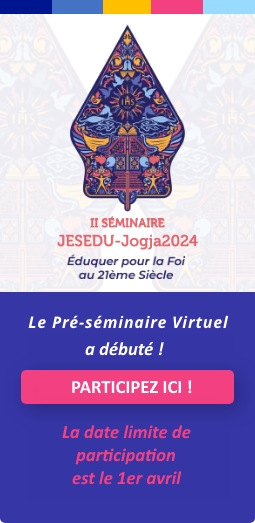The first global identifier of the recent document Living Tradition affirms that “Jesuit Schools are committed to being Catholic and to offer in-depth faith formation.” During our recent II Colloquium JESEDU-Global 2021, Fr. James Hanvey SJ argued that this first global identifier is fundamental to a Jesuit School and without it, it is not really possible to talk about Jesuit Education. Afterall, the reason why the first Jesuits engaged in education was their desire to share their spiritual experience with the new generations. The mission of the Society of Jesus has always been, as the first Universal Apostolic Preference states, to lead people to God, so that people can experience the transforming power of Christ in their lives. Jesuit Education is an education inspired by faith within the Catholic Church tradition.
However, many of our schools happily welcome students from all kinds of religious and secular backgrounds. We do this because our faith experience guides us to welcome all. The Congregation for Education of the Vatican named its most recent document on education The Identity of the Catholic School for a Culture of Dialogue (2022). The Congregation maintains that the Church “considers dialogue as a constitutive dimension… it must therefore ‘practice the ‘grammar of dialogue’, not as a technical expedient, but as a profound way of relating to others.” Therefore, our Catholic identity actually requires entering in respectful dialogue with others as Pope Francis has repeatedly done in recent years. This dialogue means respecting their religious or secular identity and encouraging a dialogue to really become brothers and sisters united in our common human identity.

This dialogue does not mean to renounce or water down the Catholic identity of a Jesuit school since, as Pope Francis explains, “We cannot create a culture of dialogue if we do not have identity.” (Collegio San Carlo, Milan, 2019). Dialogue requires identity, as without it, it is not really possible to engage in real dialogue. Our schools do have an identity based in the spiritual experience of St. Ignatius and the first Jesuits who were profoundly rooted in the Catholic Church. This identity continue today with the new generations of Jesuits and partners in mission that tirelessly work to make Jesuit education possible today. Ignatian spirituality has also led Jesuits and partners in mission to respectfully engage with other cultures and religions. Mateo Ricci, a 16th century Jesuit, was able to find God in the Chinese culture and led people to God through his knowledge and teaching of Astronomy and Math. He entered into a profound dialogue with the Chinese culture and became “enculturated” in this culture to the point that he is still today widely respected in China as a westerner who became “one of us.”

 Nowadays Jesuit Education wishes to continue the dialogue with other religions and worldviews. A practical way to live this dialogue today is presented in the Living Tradition document through the dialogue school type: “which explicitly chooses to be inspired by its Christian traditions while accepting the presence of other traditions. In this school there is a preferential option for the Christian tradition, which keeps re-evaluating what it means to be a Christian in the midst of a plurality of other options. It is the school that promotes a maturity in the students’ own faith through dialogue, formation, and interaction. It is this model of school that should inspire Jesuit schools.” (#167)
Nowadays Jesuit Education wishes to continue the dialogue with other religions and worldviews. A practical way to live this dialogue today is presented in the Living Tradition document through the dialogue school type: “which explicitly chooses to be inspired by its Christian traditions while accepting the presence of other traditions. In this school there is a preferential option for the Christian tradition, which keeps re-evaluating what it means to be a Christian in the midst of a plurality of other options. It is the school that promotes a maturity in the students’ own faith through dialogue, formation, and interaction. It is this model of school that should inspire Jesuit schools.” (#167)
I recently visited the School Saint-Mauront in Marseille, France. Most of the students come from a Muslim background. The school welcomes them, and many parents choose this school because they feel respected and welcome. The school also celebrates its Catholic identity which is explicitly present in the school and its documents. Students feel respected in their religious identities and are encouraged to enter into a dialogue with the Catholic Tradition that welcomes them. This also happens in many other Jesuit schools around the world. In Nigeria our schools also welcome Muslim students in a country that suffers from religious fundamentalism and violence. Parents, in Nigeria, choose a Catholic/Jesuit school because of its religious identity and welcome the contact with the spiritual vision of the Jesuits. In Japan many of our students are Buddhists, in India Hindus, in some parts of Europe secular. Many Christians, Muslims, Buddhists, Hindus, and non-religious families want their children to have the experience of a Jesuit Education. We welcome them and offer our faith experience as part of who we are in dialogue with their own backgrounds. Because of our religious identity we welcome them and respectfully present the experience that makes us who we are!

Se connecter ou Adhérer
pour créer et afficher des commentaires
